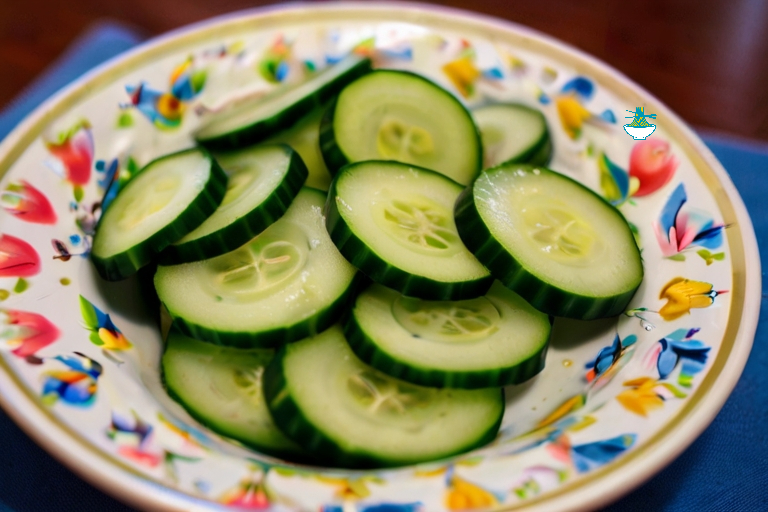Indulge in the crisp flavors of Estonia with our Kurgisalat recipe, a beloved cucumber salad that offers a refreshing twist to any meal. This traditional Estonian dish combines thinly sliced cucumbers, tangy vinegar, and a hint of dill for a burst of freshness in every bite. Whether served as a side dish or a light snack, Kurgisalat embodies the essence of Estonian cuisine, bringing a taste of the Baltic to your table.

Ingredients:
- 2 large cucumbers
- 1 small red onion
- 2 tablespoons chopped fresh dill
- 2 tablespoons white vinegar
- 1 tablespoon sugar
- Salt, to taste
- Black pepper, to taste

Instructions:
1- Start by washing the cucumbers thoroughly under cold water. Peel the cucumbers if desired, although leaving the skin on can add color and texture.
2- Cut the cucumbers into thin slices. You can use a sharp knife or a mandoline slicer for uniform slices.
3- Peel the red onion and slice it thinly. If you find the flavor of raw onion too strong, you can soak the sliced onion in cold water for about 10 minutes to mellow the taste. Drain before using.
4- In a mixing bowl, combine the sliced cucumbers, sliced red onion, and chopped fresh dill.
5- In a small bowl, whisk together the white vinegar and sugar until the sugar is dissolved. This creates the dressing for the salad.
6- Pour the vinegar dressing over the cucumber mixture. Season with salt and black pepper to taste.
7- Gently toss the salad until the cucumbers and onions are evenly coated with the dressing.
8- Cover the bowl with plastic wrap or a lid and refrigerate for at least 30 minutes to allow the flavors to meld together.
9- Before serving, give the salad a quick stir and adjust seasoning if necessary. You can garnish with additional fresh dill if desired.
10- Serve the Kurgisalat chilled as a refreshing side dish alongside your favorite Estonian main courses, such as grilled meats or fish, or enjoy it as a light and healthy snack on its own.
Nutritional Values:
Here's an approximate nutritional breakdown for the ingredients used in the Kurgisalat recipe:
Cucumbers (2 large cucumbers):
- Calories: 45 kcal
- Carbohydrates: 11 g
- Fiber: 2 g
- Protein: 2 g
- Fat: 0.5 g
- Vitamin C: 14% DV
- Vitamin K: 62% DV
- Potassium: 442 mg
- Magnesium: 10% DV
benefits:
- Cucumbers are low in calories and high in water content, making them hydrating and ideal for weight management.
- They are a good source of vitamin C, which supports immune function and skin health.
- Cucumbers also provide vitamin K, which is important for bone health and blood clotting.
Red onion (1 small):
- Calories: 29 kcal
- Carbohydrates: 7 g
- Fiber: 1 g
- Protein: 1 g
- Fat: 0 g
- Vitamin C: 9% DV
- Vitamin B6: 5% DV
- Folate: 3% DV
- Potassium: 102 mg
benefits:
- Red onions are rich in antioxidants, particularly flavonoids like quercetin, which may help reduce inflammation and lower the risk of chronic diseases.
- They contain vitamin C, which supports immune function and collagen production for healthy skin.
- Red onions also provide small amounts of fiber, which aids in digestion and promotes gut health.
Fresh dill (2 tablespoons chopped):
- Calories: 4 kcal
- Carbohydrates: 1 g
- Fiber: 0 g
- Protein: 0 g
- Fat: 0 g
- Vitamin C: 2% DV
- Vitamin A: 9% DV
- Calcium: 1% DV
- Iron: 1% DV
benefits:
- Dill is a good source of antioxidants, including flavonoids and polyphenols, which may help protect against cellular damage and oxidative stress.
- It contains vitamin A, which is important for vision health and immune function.
- Dill is also known for its antimicrobial properties and may help inhibit the growth of harmful bacteria in the body.
White vinegar (2 tablespoons):
- Calories: 2 kcal
- Carbohydrates: 0 g
- Fiber: 0 g
- Protein: 0 g
- Fat: 0 g
- Sodium: 0 mg
- Potassium: 1 mg
benefits:
- White vinegar has been associated with various health benefits, including blood sugar control and improved insulin sensitivity, when consumed in moderation.
- It may aid in digestion by promoting the production of stomach acid, which can help break down food more effectively.
- White vinegar has antimicrobial properties and can be used as a natural household cleaner.
Sugar (1 tablespoon):
- Calories: 49 kcal
- Carbohydrates: 12 g
- Fiber: 0 g
- Protein: 0 g
- Fat: 0 g
benefits:
- While sugar is often used to add sweetness to dishes, it provides little to no nutritional value and is high in empty calories.
- In small amounts, sugar can provide a quick source of energy, but excessive consumption has been linked to health issues such as obesity, diabetes, and heart disease.
- When possible, it's advisable to limit added sugar intake and opt for healthier sweeteners or reduce sugar content in recipes.
Please note that these values are approximate and may vary based on factors such as specific brands of ingredients and serving sizes


Comments